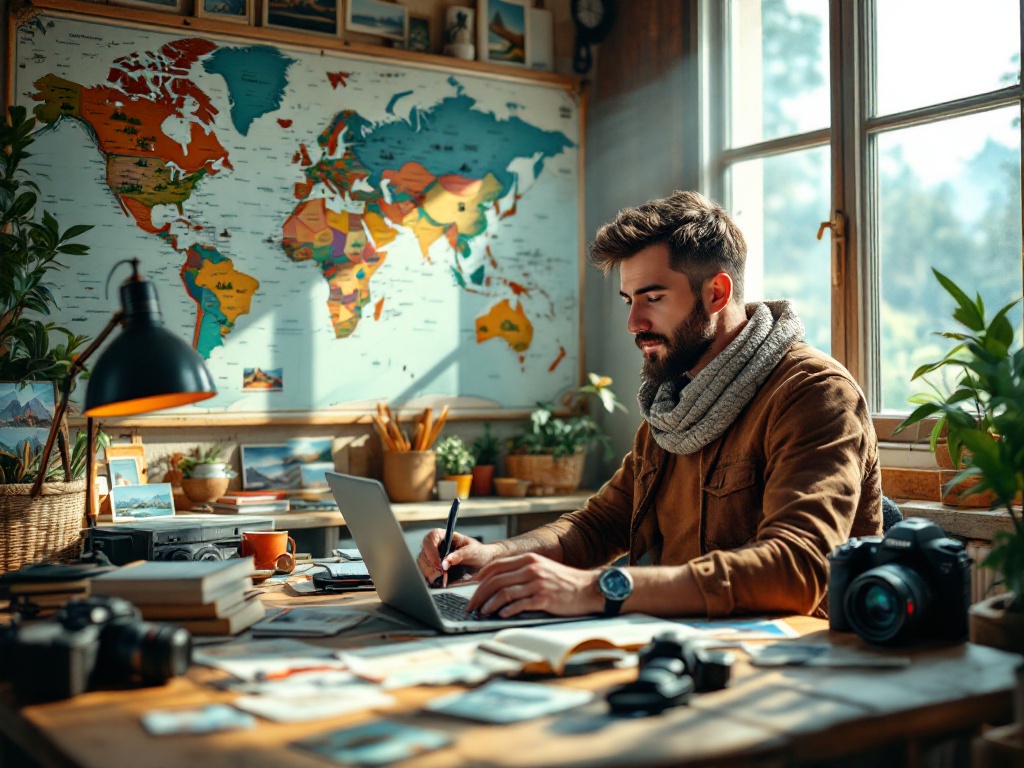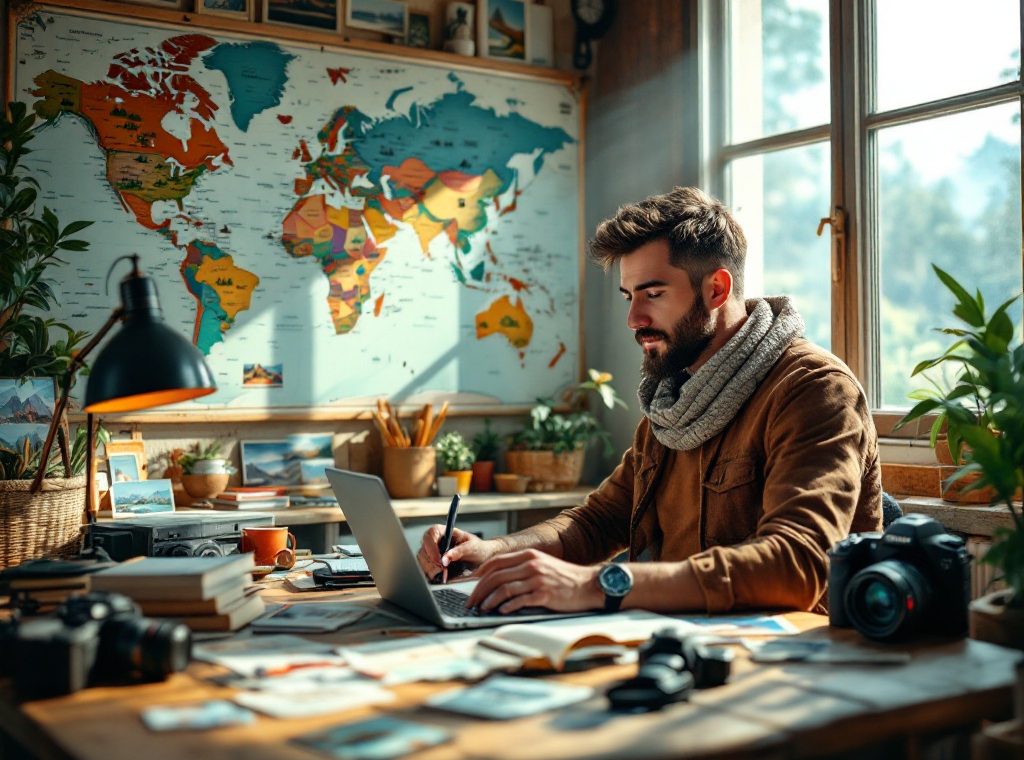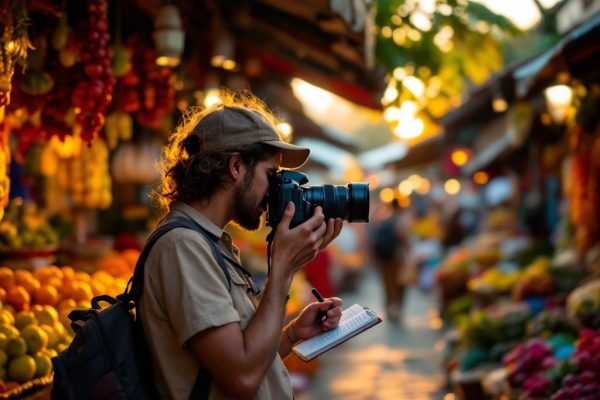A Day in the Life of a Travel Journalist
Ever dreamt of a career that blends thrilling adventures with captivating storytelling? Travel journalism offers a dynamic life, splitting time between exploring exotic locales and crafting engaging content from a home office. This career demands adaptability, balancing meticulous research and interviews with the unpredictable nature of travel. Discover the exciting, yet challenging realities of a travel journalist’s life, from mastering time management and networking to overcoming logistical hurdles and finding creative inspiration. Embark on this journey to uncover the secrets to a successful and fulfilling career in travel writing.
Important information

- Travel journalists split their time between traveling (around 150 days) and writing/researching at home (around 215 days).
- The job requires strong writing skills, adaptability, and meticulous planning, including detailed itineraries and research.
- Networking is crucial for finding opportunities, building relationships with editors, and gaining industry insights.
- Travel journalists conduct interviews, engage with local communities, and manage logistics to create authentic and compelling stories.
- Challenges include unpredictable events, tight deadlines, financial instability (especially for freelancers), and maintaining work-life balance.
A Day in the Life of a Travel Journalist
A travel journalist’s day is dynamic and varies greatly depending on the location and assignment. Often beginning before sunrise, the journalist reviews the day’s itinerary, which could include visiting historical sites, conducting interviews, or researching local customs. Mornings are typically spent exploring these destinations, taking detailed notes and capturing evocative photographs. Afternoons are dedicated to writing and editing, often fueled by coffee in a cozy cafe or the collaborative atmosphere of a co-working space. Evenings can bring exciting events or valuable networking opportunities. Adaptability is essential, as plans can change quickly. Balancing exploration, documentation, and content creation, a travel journalist leads a busy, yet exciting and fulfilling life. One day might involve hiking through a lush rainforest, while the next could involve interviewing a renowned chef. Strong writing skills and a deep passion for travel are essential for this career.
Daily Routine: A Blend of Writing and Travel
Travel journalists live exciting, fast-paced lives, expertly balancing writing deadlines with the thrill of global exploration. While they may spend 150 days a year traveling, they dedicate the remaining 215 days to crafting stories from their home offices. Whether exploring a bustling marketplace or relaxing at home, writing is a daily constant.
Travel Schedule: Balancing Time on the Road and at Home
Successfully balancing work and travel is a hallmark of skilled travel journalists. Meticulous planning is essential, with dedicated time carved out for writing, research, and exploration. Some adhere to strict schedules, while others capitalize on travel downtime—drafting articles on trains or planes, for instance. This adaptable approach facilitates both immersive experiences and timely content creation. Travel writing rarely conforms to a traditional workday; it requires flexibility. However, effective time management makes this dynamic career not only possible but also deeply rewarding.
The Work Dynamics of a Travel Writer
Travel writers wear many hats. They craft captivating stories, blog posts, articles, and social media updates. They gather diverse perspectives by interviewing locals, experts, and fellow travelers, gaining valuable cultural insights. Networking with industry professionals at conferences and press trips opens doors to new opportunities. They also meticulously research destinations, plan trips, and manage their travel logistics, skillfully balancing work and leisure.
Writing Activities: Crafting Compelling Travel Stories
Travel journalists create captivating stories by following a daily writing routine. This involves researching locations and structuring articles, a methodical process that guarantees consistent, engaging content. To gain unique insights and vibrant details, they jot down notes and write during their travels, ensuring their work remains current and accurate.
Conducting Interviews and Gathering Cultural Insights
Travel journalists gain firsthand knowledge by interviewing locals, experts, and fellow travelers. Thorough preparation, including researching interviewees and crafting insightful questions, is essential for a successful interview. These conversations offer valuable cultural insights, adding authenticity and depth to travel writing. Readers gain a richer understanding and experience the destination more vividly through these nuanced perspectives, resulting in more compelling stories.
Research and Storytelling in Travel Journalism
Destination research is crucial for travel journalists, providing valuable cultural insights and background information that helps them uncover unique story angles. Outlining is a key element of this process, ensuring well-structured articles and keeping writers focused, maximizing their time on location to capture compelling stories.
Travel journalists, often writing on the road, record their observations and impressions immediately to ensure accuracy. Whether using notebooks or digital devices, this practice captures the immediacy of their experiences, aids in organization, and allows for more efficient storytelling by simplifying the management of large amounts of information.
Researching Destinations and Outlining Features
Travel journalists delve into their destinations, exploring local customs, investigating historical sites, and documenting geographical wonders. This meticulous research forms the basis of their articles, ensuring comprehensive coverage and accurate storytelling. For example, they might pinpoint a location’s key features to structure their writing effectively. This thorough preparation builds credibility with readers who value accuracy and brings the journey to life.
Taking Notes and Writing on the Road
Travel writing thrives on detailed notes taken during your trips, which help capture vivid details for accurate articles. However, this presents challenges. Spotty Wi-Fi, uncomfortable writing spots, and constant distractions hinder focus. Juggling sightseeing with deadlines requires discipline and efficient time management.
Challenges
- unreliable Wi-Fi,
- uncomfortable writing locations,
- constant distractions.
Solutions
- Discipline,
- efficient time management.
Travel Writing Challenges and Opportunities
Travel writing, despite its allure, presents numerous hurdles. Travel journalists grapple with unpredictable logistics, tight deadlines, and the constant demand for creative content. Unexpected events, like sudden weather changes or local regulations, can disrupt meticulously planned itineraries. Financial instability, particularly for freelancers, adds another layer of complexity. Maintaining a work-life balance can also be a struggle, as writers adapt to varying time zones and cultures while constantly seeking fresh perspectives in this competitive field. The pressure to produce engaging, relevant, and unique stories within budget is relentless. Despite these challenges, travel journalism offers immense rewards.
Challenges of Travel Writing
- Unpredictable logistics.
- Tight deadlines.
- Constant demand for creative content.
- Disruptions from unexpected events (weather, regulations).
- Financial instability, especially for freelancers.
- Difficulty maintaining work-life balance.
- Adapting to varying time zones and cultures.
- Pressure to produce engaging and unique stories within budget.
Essential Skills for Travel Writers
- Meticulous itinerary planning.
- Thorough research.
- Insightful interviewing.
- Effective financial management.
- Meeting deadlines.
- Adapting to unforeseen circumstances.
- Effective time management and disciplined approach.
- Prioritizing tasks and maintaining focus.
The Unglamorous Side of Travel Writing: Overcoming Challenges
The life of a travel writer isn’t always as glamorous as it seems. While the job might sound exciting, it presents numerous challenges.
Challenges of a Travel Writer
- Logistical nightmares,
- tight deadlines,
- constant pressure of generating fresh content.
Unexpected Hurdles
- Transportation delays disrupting carefully planned itineraries,
- sudden regulatory changes adding complexity,
- financial instability, particularly for freelancers.
Maintaining a work-life balance is also difficult with demanding travel schedules and the need to adapt to diverse cultures and environments. It’s a demanding career, but the rewards can be immense for those who persevere.
Managing a Hectic Lifestyle: Balancing Multiple Tasks
Effective time management is essential for a busy lifestyle. Travel journalists, for example, often use techniques like time blocking and task management apps to boost their productivity. Setting realistic goals is also vital, avoiding overcommitment to maintain a healthy work-life balance. This balance should include regular exercise and downtime to improve well-being. Delegating tasks when possible allows for focusing on more critical activities. Strong organizational skills streamline workflows and minimize stress. To reduce travel stress, experienced journalists prepare detailed itineraries and packing lists. Being flexible is crucial; adapting to unexpected delays and unavoidable plan changes is essential for success.
Set Realistic Goals: Define achievable goals to avoid overcommitment and maintain a work-life balance.
Utilize Time Management Techniques: Employ methods like time blocking and task management apps to enhance productivity.
Prioritize Well-being: Incorporate regular exercise and downtime to promote physical and mental health.
Delegate Tasks: Offload tasks when possible to free up time for more important activities.
Hone Organizational Skills: Develop strong organizational skills to streamline workflows and reduce stress.
Plan Thoroughly: Create detailed itineraries and packing lists to minimize travel stress.
Embrace Flexibility: Be adaptable to unforeseen delays and plan changes for a successful and less stressful experience.
Networking and Industry Connections
Networking is essential for travel journalists, forging strong relationships with editors, fellow writers, and PR professionals. These connections unlock collaborations, new opportunities, and valuable industry insights. Attending conferences and networking lunches facilitates these connections and provides platforms to pitch stories. Beyond formal events, engaging with local communities during trips is crucial. Talking to locals unveils unique story angles, deepens cultural understanding, and enriches travel writing. Here’s how networking enhances travel journalism:
Building Relationships
- Connect with editors for story assignments.
- Collaborate with fellow writers on projects.
- Gain insights from PR professionals about destinations and trends.
Finding Opportunities
- Discover new story ideas through industry connections.
- Pitch stories directly to editors at conferences and events.
- Access exclusive press trips and media opportunities.
Engaging with Local Communities
Talking to locals unveils unique story angles, deepens cultural understanding, and enriches travel writing. It provides authentic insights and first-hand perspectives, leading to more compelling and meaningful stories.
Making Connections and Pitching to Publications
Aspiring travel journalists can break into print by pitching compelling story ideas to editors. These pitches must offer a fresh perspective and resonate with the publication’s target audience. Networking, both in person and online, is crucial for success.
In-Person Networking
Conferences and workshops offer invaluable face-to-face connections.
Online Networking
Social media and email can bridge geographical distances.
Building a relationship with an editor before pitching significantly increases your odds of publication. This prior connection can make all the difference.
Attending Travel Industry Conferences and Networking Lunches
Travel journalists broaden their professional networks through diverse channels, such as industry conferences and networking lunches. These events provide invaluable opportunities to connect with tourism boards, fellow journalists, and publication editors. Such connections can lead to exciting collaborations, unlock new assignments, and ultimately advance a journalist’s career.
Tips for Aspiring Travel Journalists
Elevate your writing by crafting compelling narratives with vivid descriptions and accurate reporting. Cultivate your distinct voice through regular practice and feedback from seasoned writers. For further development, consider joining a writer’s workshop or online community.
Seeking creative sparks?
Tap into your personal experiences, explore diverse cultures and historical events, and embrace unique perspectives. Traveling and engaging with your community can unearth hidden gems of inspiration.
Experiment with various writing styles:
- blog posts,
- articles,
- social media content.
Develop your writing skills
Regular practice and feedback from experienced writers are crucial for improvement.
Consider:
- joining a writer’s workshop,
- participating in an online writing community.
Writing Tips and Craft Development
Energize your prose with vibrant verbs and evocative nouns.
Embrace the active voice for impactful writing.
Cultivate a distinctive style that sets you apart.
Immerse yourself in diverse travel narratives for inspiration.
Hone your descriptive skills to paint vivid pictures of places.
Become your own discerning critic.
Experiment with narrative techniques to discover your voice.
Seek constructive criticism and join supportive writing communities.
Master the art of storytelling to captivate your readers.
Creative Inspiration and Content Creation
Immerse yourself in new cultures and explore unfamiliar destinations.
Document your unique journey to add authenticity to your narratives.
Engage with locals, uncovering hidden stories and fresh perspectives.
Delve into the arts—photography, sketching, or music—and let your travels ignite your creativity.
Transform these experiences into compelling narratives.












